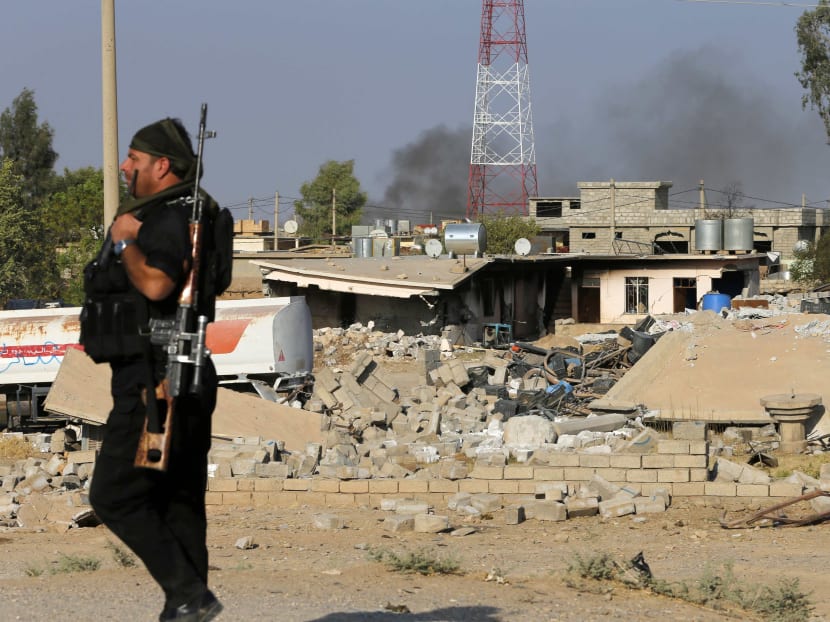US air strikes hit IS targets near Baghdad
WASHINGTON — The United States, as promised by President Barack Obama, has stepped up its air-strike campaign in Iraq, hitting targets near Baghdad in the effort to help the Iraqi government win back territory seized by the Islamic State in Iraq and Syria, said Pentagon officials.

A Kurdish Peshmerga fighter walks past a house destroyed by American air strikes at Barznki village two days ago in Zummar, controlled by Islamic State (IS), near Mosul, Sept 15, 2014. Photo: Reuters
WASHINGTON — The United States, as promised by President Barack Obama, has stepped up its air-strike campaign in Iraq, hitting targets near Baghdad in the effort to help the Iraqi government win back territory seized by the Islamic State in Iraq and Syria, said Pentagon officials.
The offensive is the first expansion of the US campaign against the Islamist militant group that Mr Obama outlined last week in a speech to the nation.
The new campaign included a strike on Monday south-west of Baghdad and one the day before near Sinjar, Iraq, the Defence Department said in a statement.
The strikes, the Pentagon said on Monday, go beyond Washington’s initial mission announced last month of “protecting our own people and humanitarian missions”.
The strikes on Sunday and Monday involved both attack and fighter aircraft, which the Pentagon said destroyed six vehicles near Sinjar and an Islamic State combat post that was firing on Iraqi troops.
Previous American air strikes in Iraq have focused on northern areas of the country in support of Kurdish Peshmerga forces and besieged communities from Iraq’s Yazidi ethnic minority. The US has now carried out 162 air strikes across Iraq to counter an Islamic State offensive that in recent months has quickly gained ground in northern Iraq and Syria and set up what the group said was an Islamic Caliphate.
The latest offensive was a small first step in what the President said last week would be a major and longstanding expansion of the military campaign against the militant group.
That ambitious proposal includes American air strikes in Syria and the deployment of 475 more military advisers to Iraq, bringing the total to 1,600.
Mr Obama has vowed that the US does not intend to go it alone and the administration said Sunday it had lined up support from Arab nations to help in the air-strike campaign, although officials would not say when that assistance would come or who would provide it.
Saudi Arabia has already agreed to provide a base to train Syrian fighters who oppose both the Islamic State and President Bashar Assad.
Mr Obama announced the first air strikes against the group early last month, when it appeared that the Kurdish capital, Erbil, would fall to the Islamists.
With the momentum for strikes building, senior administration officials on Monday said it would retaliate against Mr Assad’s air defences if he were to go after American planes launching air strikes in his country.
Officials said the US has a good sense of where the Syrian air defences, along with their command and control centres, are located.
If Mr Assad were to use those capabilities to threaten US forces, it would put his air defences at risk, said the officials, who insisted on anonymity in order to discuss the administration’s thinking.
Asked Monday about the prospect of striking Mr Assad’s regime if his forces were to target Americans, White House spokesman Josh Earnest said there will be “rules of engagement that are related to any military orders the President directs”.
“It won’t surprise you to know that there are contingencies related to self-defence when it comes to these sorts of rules of engagement,” he said.
Mr Obama is seeking congressional authorisation to train and arm Western-backed rebels in the country in hopes they can both fight the Islamic State and eventually the Assad regime. US officials, however, have ruled out direct coordination with Mr Assad and insist that a campaign against the Islamic State will not strengthen the Syrian dictator’s hold on power.
Meanwhile, the Iraqi Parliament yesterday rejected the Prime Minister’s nominees for Defence and Interior Ministers, leaving the two crucial posts unfilled.
Prime Minister Haider Abadi put forward Sunni lawmaker Jaber Al Jabberi as his candidate for Defence Minister and Shia lawmaker Riyad Ghareeb as his pick for Interior Minister. Parliament, which could confirm the nominees with a simple majority, voted 118-117 against Mr Ghareeb and 131-108 against Mr Al Jabberi.
Mr Mohsen Laftah Asfour, a lawmaker with Shia cleric Muqtada Al Sadr’s bloc, was the only lawmaker approved in yesterday’s session and will assume the role of Water Resources Minister. Parliament adjourned until tomorrow. Agencies






